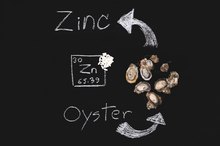Skin Rashes & Zinc
Skin rashes and zinc are intimately connected. In some cases skin rashes such as pityriasis rosea and contact dermatitis can be healed with products containing zinc; in other cases, zinc may actually cause skin rashes to develop. The body requires zinc to uphold the integrity of the skin and the mucus membranes, according to the National Institutes of Health Office of Dietary Supplements 1. Zinc deficiencies often manifest in skin problems such as rashes and inflammation, and too much zinc can have the same effect.
Pityriasis Rosea
Pityriasis rosea is a skin rash characterized by small lesions that develop on the trunk and sometimes the arms and legs. In about 25 per cent of cases, pityriasis rosea causes extreme itching; otherwise the condition remains asymptomatic. ; January 2004'). of the Utah Valley Regional Medical Center. Zinc oxide is regularly prescribed and often clears up pityriasis rosea within five to eight weeks.
- Pityriasis rosea is a skin rash characterized by small lesions that develop on the trunk and sometimes the arms and legs.
- In about 25 per cent of cases, pityriasis rosea causes extreme itching; otherwise the condition remains asymptomatic.
- ;
Zinc Deficiency
Side Effects of Zinc Lozenges
Learn More
A zinc deficiency may cause acrodermatitis enteropathica, a skin rash that develops around the orifices such as the mouth, eyes and anus 3. Zinc deficiency may result from inadequate zinc in the diet, inflammatory bowel disease or intestinal bypass surgery. Zinc supplementation typically clears up acrodermatitis enteropathica within two weeks, according to Dr. Amanda Oakley of the New Zealand Dermatological Society 3.
Zinc Poisoning
Zinc poisoning may occur due to overexposure to the zinc found in wood preservatives, dyes, supplements, rubber or rust coatings 4. Zinc poisoning can cause:
- skin rash
- as well as chills
- convulsions
- fever
- shortness of breath
- shock
- bloody diarrhea 4
Treatment typically involves gastric lavage to flush the zinc out of the stomach.
Atopic Dermatitis
Seborrheic Dermatitis & Zinc
Learn More
Zinc often helps soothe the dry, itchy rash associated with atopic dermatitis, or eczema as it is most commonly known 6. Atopic dermatitis tends to affect women more than men and hereditary is the greatest risk factor for developing the condition 6. Zinc oxide is often proscribed by dermatologists to treat the inflammation associated with atopic dermatitis 6.
Related Articles
References
- National Institutes of Health Office of Dietary Supplements: Zinc; April 2011
- "American Family Physician"; Pityriasis Rosea; Daniel L. Stulberg, M.D.; January 2004
- DermNet NZ: Acrodermatitis Enteropathica
- MedlinePlus: Zinc Poisoning
- Skin Care Physicians: Doctor, why are you Prescribing an Ointment?
- Skin Care Physicians: Atopic Dermatitis
- Crohn's and Colitis Foundation of America. "Extraintestinal Complications: Skin Disorders." CCFA.org 1 May 2012.
- Office of Dietary Supplements, National Institutes of Health. "Dietary Supplement Fact Sheet: Zinc." National Institutes of Health. 11 Feb 2016.
Resources
Writer Bio
Emma Cale has been writing professionally since 2000. Her work has appeared in “NOW Magazine,” “HOUR Magazine” and the “Globe and Mail.” Cale holds a Bachelor of Arts in English from the University of Windsor and advanced writing certificates from the Canadian Film Centre and the National Theatre School of Canada.









